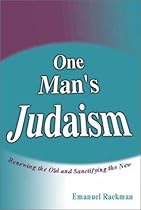 Rabbi Rackman was an influential Orthodox rabbi whom I remember best from hearing his eloquent sermons at the Fifth Avenue Synagogue every week when I was a young college boy.
Rabbi Rackman was an influential Orthodox rabbi whom I remember best from hearing his eloquent sermons at the Fifth Avenue Synagogue every week when I was a young college boy.Emanuel Rackman, Prominent Rabbi, Dies at 98
By WILLIAM GRIMES
Emanuel Rackman, the spiritual leader of the prominent Fifth Avenue Synagogue in Manhattan and an outspoken advocate of a more inclusive, intellectually open Orthodox Judaism, died Monday at his home in Manhattan. He was 98.
The death was confirmed by his granddaughter Jessica Rackman.
A lawyer and a Talmudist by training, Rabbi Rackman argued for a more flexible interpretation of Orthodoxy and the relevance of traditional Jewish law to modern life.
“Perhaps, like Socrates, I corrupt youth, but I do teach that Judaism encourages doubt, even as it enjoins faith and commitment,” he wrote in Commentary in 1966. “A Jew dare not live with absolute certainty not only because certainty is the hallmark of the fanatic and Judaism abhors fanaticism, but also because doubt is good for the human soul, its humility, and consequently its greater potential ultimately to discover its Creator.”
Rabbi Rackman was born in Albany, the son of a businessman and Talmudist who was descended from six generations of rabbis. He studied at the Talmudical Academy in New York, the high school affiliate of Rabbi Isaac Elchanan Theological Seminary, where he continued his Talmudic studies while attending Columbia University, which awarded him a law degree in 1933 and a doctorate in public law in 1952. In 1934 he was ordained a rabbi.
He practiced law for nine years and was a weekend rabbi on Long Island. In accordance with family tradition, he planned to earn his living as a lawyer rather than as a rabbi, but on entering the Air Force in 1943, he was made a chaplain. While in Germany, where he was military aide to the European Theater commander’s special adviser on Jewish affairs, his encounters with Holocaust victims caused him to reconsider his career.
In 1951, he was called up for active duty from the Air Force Reserve, but found that his security clearance had been revoked because of his outspoken opposition to the death penalties handed down in the Rosenberg spying case and his support for the radical singer Paul Robeson.
Given the choice between accepting an honorable discharge or facing a military trial, he opted for a trial. He not only won acquittal but earned a promotion from major to lieutenant-colonel.
After the war, Rabbi Rackman became spiritual leader of Congregation Shaaray Tefila in Far Rockaway, Queens. He also taught political science at Yeshiva College and helped edit the journal Tradition. In the 1950s, he was president of the New York Board of Rabbis and of the Rabbinical Council of America.
He quickly emerged as an important voice for modern Orthodoxy. Shocking traditionalists, he made common cause with Reform and Conservative rabbis, notably on the issue of Jewish family law and the plight of women denied a religious divorce by their husbands.
He presented his case for modern Orthodoxy in “One Man’s Judaism” (1970) and “Modern Halakhah for Our Time” (1995). Halakhah is the set of rules and practices governing Jewish life.
In 1967, he became the rabbi of the Fifth Avenue Synagogue and soon after was named provost of Yeshiva University. In 1971 he became the head of Jewish Studies at the City University of New York. In 1977, he became the first American president of Bar-Ilan University in Israel.
Rabbi Rackman is survived by a sister, Bess Falkow of Tucson, Ariz.; three sons, Michael, of Brooklyn, Bennett, of Queens, and Joseph, of Scarsdale, N.Y.; eight grandchildren; and 14 great-grandchildren.
1 comment:
Rabbi Rackman was my Rabbi at FAS and a good friend of the family. Even until last year, at 97, he came to Shul as often as he was able. He was respected and loved by us all. A scholar, a gentleman, and a model Jew who understood how to live in modern times. May his memory be a blessing to Am Yisrael.
Post a Comment